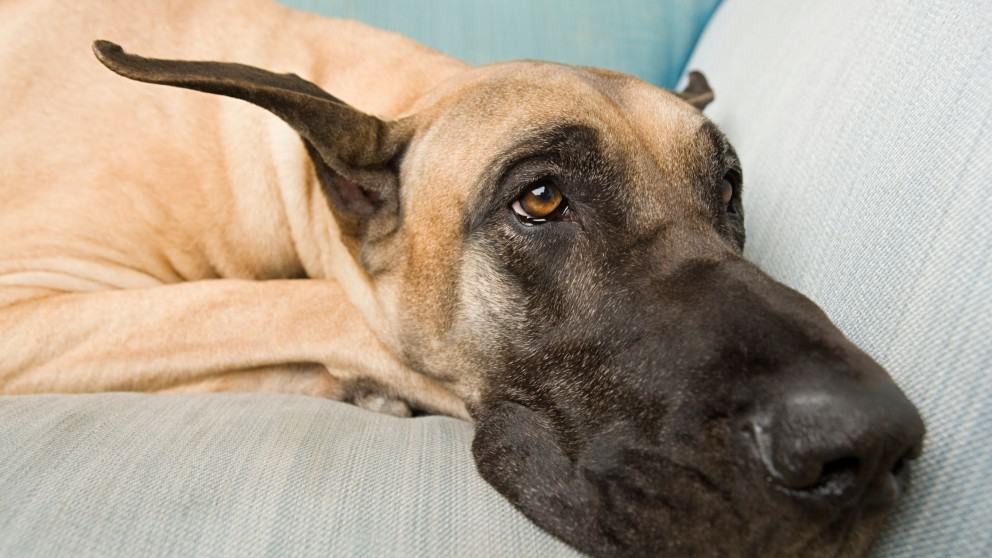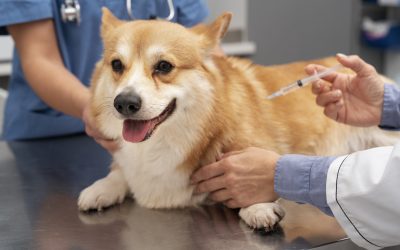Is My Dog Overweight?

We all want lean and healthy dogs. Today, obesity affects up to 44 % of pets, which places them at risk for certain health conditions. Overweight dogs may be prone to a decreased lifespan and quality of life.
While many commercial dog foods can contribute to obesity in dogs, a lack of regular exercise together with a low-quality diet that is high in carbohydrates just may determine how much excess weight your pooch gains.
How to Tell If Your Dog Is Overweight?
Obesity is one of the most preventable diseases in dogs. It can cause many concerning health issues such as diabetes, hypertension, arthritis, and possibly cancer. Weight loss needs to be a gradual process as extreme weight loss can cause your dog to become ill.
If you want your furry best friend to lose some weight, it’s important you consult with your veterinarian before starting a weight loss regimen. In the meantime, you’re probably wondering “is my dog overweight in the first place” or “does my dog have weight issues”.
Here are some tips that can help determine whether your dog is overweight:
- A dog is at its proper weight when you can feel the ribs and spinal vertebra (backbone), and there is very little underlying fat and other body tissue.
- If on the other hand, you cannot feel your dog’s ribs, he or she may be overweight.
- But it does not mean that you should be able to see your dog’s ribs either. Each rib needs to have a layer of fat surrounding it.
- You can check by doing the Body Conditioning Score (BCS) each month until your dog reaches his ideal weight.
- If looking at your dog from the side, you’ll need to see the waist “tucked’ behind the rib cage area. An easy way to check is to see if the waist area is the same size as the chest area. If it is, it’s time for a weight loss plan. This should be done together with your veterinarian to ensure that your dog loses weight slowly.
Weight Loss Exercises for a Dog
In addition to a healthy diet, exercise is extremely important in helping your dog lose weight. While exercise is highly recommended for all dogs, overweight dogs especially need at least 30 minutes of physical activity every single day.
In many cases, weight loss can be as simple as cutting back the treats and opting for a regular exercise program that allows for plenty of off-leash runs. If your pooch is lethargic, you may need to encourage playtime and build up the amount of time your pet spends at the dog park. If your furry best friend is a couch potato and loves to hang out, he or she may just be depressed or stressed. Purchasing new dog toys like dog ball launchers can help to get your dog moving. Another idea to help encourage movement is to change your dog’s environment. Sometimes a fun day at a dog-friendly beach can boost your dog’s interest and happiness levels.
By increasing your dog’s exercise routines gradually, you can also help reduce behavioral issues at home. A tired dog is a happy dog. Plus, you’ll be helping Odie burn off calories, and you’ll both be having fun!
How Does A Dog Become Overweight?
Secondly, improper diets and overfeeding can contribute in a major way to pet obesity. High-quality dog food that provides proper nutrition is preferable for maintaining a healthy weight. Dry dog food is a better option than canned food for all canines, not just overweight dogs, as it promotes gum and dental health.
But be sure to always read the label before purchasing any type of dog food. Dog food formulas are specially formulated for different life stages in your dog’s life. Here’s some more information on selecting the ideal food for your pet:
Choose the Right Dog Food Based on Breed and Age
One of the important factors to consider when choosing food for your dog is their breed. Some dog breeds are more prone to skin conditions and rashes, while others suffer from back issues. Still, other breeds, especially larger ones, experience joint problems.
Another crucial aspect that helps determine a dog’s nutritional requirements is their age. Feeding your dog the right type and amount of food is crucial to ensure they’re receiving the adequate nutrition required for optimum health at all stages of their life, be it puppyhood, adult, or senior. The right amount of proteins, fats, carbohydrates, vitamins, and minerals is essential to fuel their energy requirements at each stage, along with optimal health of bones, muscles, eyes, teeth, and other organs. Plus it helps maintain their metabolism levels and control weight.
That said, opting for specialty or prescription diets from your vet for health conditions or allergies is a good strategy for maintaining sound health, as well as dealing with health issues like kidney disease if your pet is obese due to a health condition.
Could A Medical Condition Be Causing Excess Weight?
Keeping your dog at a healthy weight keeps you ahead of the game not only in terms of ensuring that your dog is fit and happy but also in keeping a sedentary lifestyle disease at bay. Understanding that pet obesity may happen gradually over a few months allows you to consult with your veterinarian to discuss the correct feeding amounts, thus avoiding excess weight gain and potential health issues, which can be serious and end up with large veterinary bills.
Dogs may have certain health conditions that trigger obesity, which may include the following:
- Cushing’s Disease
- Hypothyroidism
- Sterilization
- Chronic inflammation
- Diabetes mellitus
Obese and Overweight Dog Health Issues
To maintain a regular weight for your dog, it’s necessary to avoid the intake of extra calories and to sustain a regular exercise routine. Besides weight control, it can lead to several healthful benefits, including maintaining muscle tone, temperature regulation, and metabolism.
That said, strenuous exercise is not beneficial to dogs and may cause problems. If your dog is obese and out of shape, avoid long, strenuous runs, especially during the hot summer months.
Let’s look at what issues obese and overweight dogs are faced with!
Research
Weight loss can help improve your dog’s quality of life.
When obese or overweight dogs lose weight, their quality of life improves compared to others that don’t. A study on canine obesity adds that “Obesity is a serious disease and can lead to many other health disorders including diabetes, heart disease, and arthritis” via Science Daily. In this study, a quality of life questionnaire was answered. “A range of life quality factors were scored, including vitality, emotional disturbance, and pain. The quality of life of the dogs which succeeded with their weight loss program was also compared with that of those who failed to lose weight successfully.”
The study goes on to add that “The results showed that the quality of life improved in the dogs that had successfully lost weight; in particular, vitality scores increased, and the score for emotional disturbance and pain decreased. Moreover, the more body fat that the dog lost, the greater the improvement in vitality. Dr. Penelope Morris, from the WALTHAM Centre for Pet Nutrition, added: “Strategies for combating obesity and keeping dogs fit and healthy include portion control, increased exercise, and diets specifically formulated for overweight pets.”
It can also reduce their risk for metabolic abnormalities.
Another study demonstrates that obese and overweight dogs are also at a risk for the health conditions that are experienced by humans. This study says that “obese dogs can experience metabolic syndrome, a condition that describes multiple health issues that occur in the body at the same time.
The condition occurs when a number of health problems, such as increased blood glucose and cholesterol levels, develop together, potentially increasing the risk of other diseases, such as cardiovascular disease and diabetes.”
The study involved 35 obese dogs, of which 20% were found to have metabolic syndrome. Similar to humans with the condition, obese dogs had increased blood insulin, suggesting that the pancreas is working harder than normal to control the blood glucose. Blood adiponectin, a protein produced by fat cells that helps control sugars and fats, was also at lower levels than normal. It is yet to be determined, however, what the exact health impacts of these issues are on dogs and if they are similar to the diseases that metabolic syndrome can lead to in humans.
The study concludes that the metabolic abnormalities identified in obese and overweight dogs improved when they successfully lost weight.
Other Health Issues Resulting from Canine Obesity
Weight loss for both humans and pets is a popular trend, but everywhere you turn today, you’ll see obese pets and people. Adjusting the amount of food that you feed your pet and feeding it a high-protein, low-carbohydrate diet may help prevent loss of muscle mass while consuming a calorie-restricted diet. You can also increase outdoor positive dog training sessions, which you can incorporate off-leash runs. This would help with mental stimulation and training, and the team effort will keep you both bonded for life!
Opting for a high-fiber diet that is low in fat also provides fewer calories – it will help your dog lose weight while simultaneously keeping him satiated for longer hours, preventing hunger.
By staying on top of preventable weight gain in pets, you may help to avoid the following health issues:
- Poor limited liver function
- Arthritis
- Lethargy
- Diabetes
- Heart disease
- Digestive issues
- Hip dysplasia and other joint issues
- Weakened immune system
- Kidney failure
- High blood pressure
- Malignant tumors
- Cancer
Keeping your pet in optimal health and at a good weight by preventing obesity and feeding a healthy diet is an effective approach to ensure his/her longevity and physical well-being. All dogs will respond differently to weight loss diets, just like their pet parents.
Working with your veterinarian to ensure that your dog is on a balanced weight-loss diet with whole food ingredients and regular daily exercise will help determine how much weight he or she loses. Remember that pet health insurance offers routine care coverage to help with costs related to healthy weight loss in dogs and keeping your pooch healthy.
Have You Opted for Pet Insurance?
Affordable pet insurance can help you provide your dog with the appropriate health care that they need without having to worry about large, unexpected veterinary bills. Knowing that your pet’s health needs are covered gives you peace of mind.
Odie Pet Insurance provides several insurance plans that fit your budget while simultaneously providing quality coverage for all of your pet’s veterinary expenses. Learn more about our affordable pet insurance plans and get a free quote!
Read more about the limits and benefits of pet insurance.
Resources
- https://www.sciencedaily.com/releases/2012/02/120221104029.htm
- https://www.sciencedaily.com/releases/2012/10/121031111419.htm



